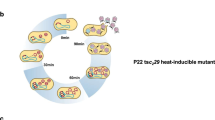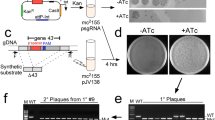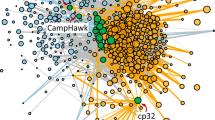Abstract
THE extent of transfer of parental DNA to progeny phage has been the subject of a number of studies1–8. These investigations have shown that approximately half the parental DNA (isotopically labelled) can be found among the progeny phage. In addition, certain experiments have suggested that, at least in the case of T4 phage, only one of the two DNA strands transmits the genetic information to the progeny virus9,10. In the case of T7 phage, however, the available data in the literature suggest that significantly less than 50 per cent of the parental DNA is transmitted to the progeny. Mackal and Kozloff2 reported, for various experiments, 32, 18, 12 and 9 per cent transmission of parental label to progeny. Recently, Miller5 reported 26 per cent transfer. For the closely related bacteriophage T3, Watson and Maaløe3 reported 46, 38, 38, 38 and 32 per cent of the parental DNA label transferred to the progeny in five separate experiments.
This is a preview of subscription content, access via your institution
Access options
Subscribe to this journal
Receive 51 print issues and online access
$199.00 per year
only $3.90 per issue
Buy this article
- Purchase on Springer Link
- Instant access to full article PDF
Prices may be subject to local taxes which are calculated during checkout
Similar content being viewed by others
References
Putnam, F. W., and Kozloff, L. M., J. Biol. Chem., 182, 243 (1950).
Mackal, R. P., and Kozloff, L. M., J. Biol. Chem., 209, 83 (1954).
Watson, J. D., and Maaløe, O., Biochim. Biophys. Acta, 10, 432 (1953).
Kozinski, A., Virology, 13, 124 (1961).
Miller, jun., R. C., J. Virology, 2, 157 (1968).
Kahn, P., J. Mol. Biol., 8, 392 (1964).
Stent, G. S., Sato, G. H., and Jerne, N. K., J. Mol. Biol., 1, 134 (1959).
Hershey, A. D., and Burgi, E., Cold Spring Harbor Symp. Quant. Biol., 21, 91 (1956).
Womack, F., and Barricelli, N. A., Virology, 27, 600 (1965).
Rosner, J., and Barricelli, N. A., Virology, 33, 425 (1967).
Sinsheimer, R. L., Starman, B., Nagler, C., and Guthrie, S., J. Mol. Biol., 4, 142 (1962).
Denhardt, D. T., and Sinsheimer, R. L., J. Mol. Biol., 12, 647 (1965).
Summers, W. C., and Szybalski, W., Virology, 34, 9 (1968).
Richie, D. A., Thomas, jun., C. A., MacHattie, L. A., and Wesink, P. C., J. Mol. Biol., 23, 365 (1967).
Kelly, jun., T. J., Fed. Proc., 27, 591 (1968).
Echols, H., Garen, A., Garen, S., and Torriani, A., J. Mol. Biol., 3, 425 (1961).
Puck, T. T., Garen, A., and Cline, J., J. Exp. Med., 93, 65 (1951).
Frankel, F. R., Proc. US Nat. Acad. Sci., 59, 131 (1968).
Author information
Authors and Affiliations
Rights and permissions
About this article
Cite this article
SUMMERS, W. Equal Transfer of both Parental T7 DNA Strands to Progeny Bacteriophage. Nature 219, 159–160 (1968). https://doi.org/10.1038/219159a0
Received:
Published:
Issue Date:
DOI: https://doi.org/10.1038/219159a0
Comments
By submitting a comment you agree to abide by our Terms and Community Guidelines. If you find something abusive or that does not comply with our terms or guidelines please flag it as inappropriate.



